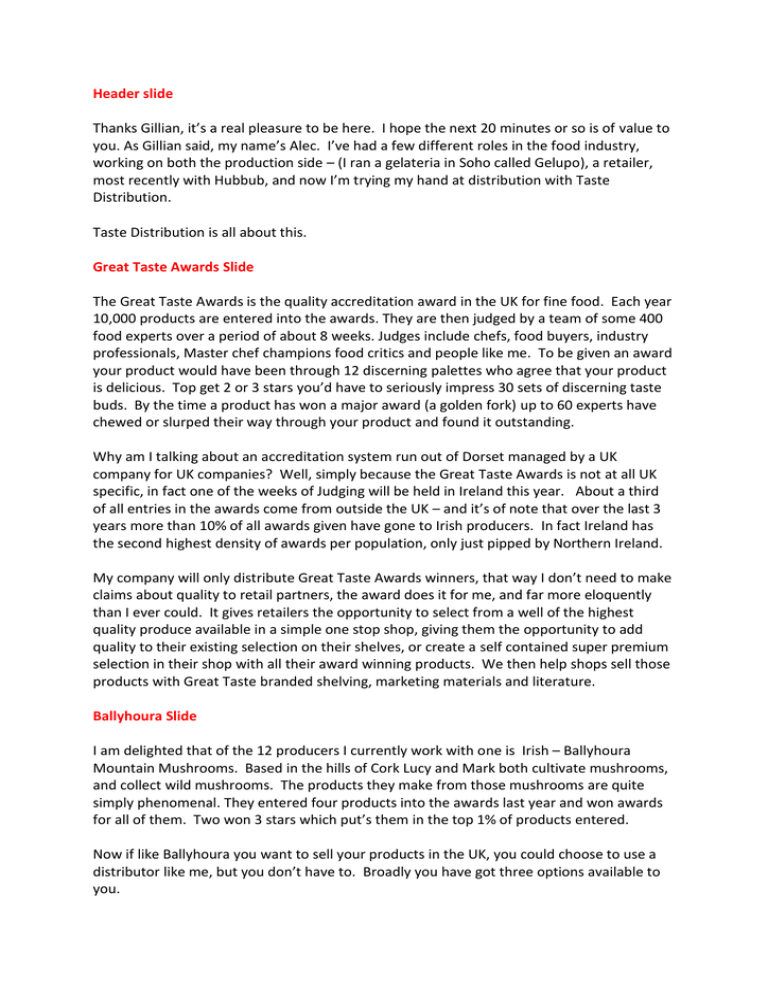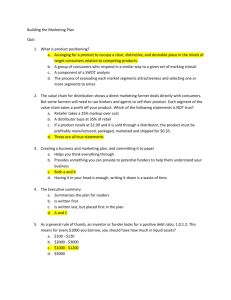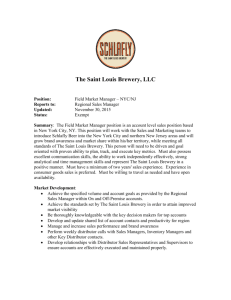Header slide
advertisement

Header slide Thanks Gillian, it’s a real pleasure to be here. I hope the next 20 minutes or so is of value to you. As Gillian said, my name’s Alec. I’ve had a few different roles in the food industry, working on both the production side – (I ran a gelateria in Soho called Gelupo), a retailer, most recently with Hubbub, and now I’m trying my hand at distribution with Taste Distribution. Taste Distribution is all about this. Great Taste Awards Slide The Great Taste Awards is the quality accreditation award in the UK for fine food. Each year 10,000 products are entered into the awards. They are then judged by a team of some 400 food experts over a period of about 8 weeks. Judges include chefs, food buyers, industry professionals, Master chef champions food critics and people like me. To be given an award your product would have been through 12 discerning palettes who agree that your product is delicious. Top get 2 or 3 stars you’d have to seriously impress 30 sets of discerning taste buds. By the time a product has won a major award (a golden fork) up to 60 experts have chewed or slurped their way through your product and found it outstanding. Why am I talking about an accreditation system run out of Dorset managed by a UK company for UK companies? Well, simply because the Great Taste Awards is not at all UK specific, in fact one of the weeks of Judging will be held in Ireland this year. About a third of all entries in the awards come from outside the UK – and it’s of note that over the last 3 years more than 10% of all awards given have gone to Irish producers. In fact Ireland has the second highest density of awards per population, only just pipped by Northern Ireland. My company will only distribute Great Taste Awards winners, that way I don’t need to make claims about quality to retail partners, the award does it for me, and far more eloquently than I ever could. It gives retailers the opportunity to select from a well of the highest quality produce available in a simple one stop shop, giving them the opportunity to add quality to their existing selection on their shelves, or create a self contained super premium selection in their shop with all their award winning products. We then help shops sell those products with Great Taste branded shelving, marketing materials and literature. Ballyhoura Slide I am delighted that of the 12 producers I currently work with one is Irish – Ballyhoura Mountain Mushrooms. Based in the hills of Cork Lucy and Mark both cultivate mushrooms, and collect wild mushrooms. The products they make from those mushrooms are quite simply phenomenal. They entered four products into the awards last year and won awards for all of them. Two won 3 stars which put’s them in the top 1% of products entered. Now if like Ballyhoura you want to sell your products in the UK, you could choose to use a distributor like me, but you don’t have to. Broadly you have got three options available to you. Distribution Option slide 1. 2. 3. Distribute yourself Partner up with a UK Brand Use a distributor (s) Distribute Yourself Slide 1. Distribute yourself. If your product has already got strong traction in Ireland, you currently distribute your products independently, and have an internal sales team then going it alone is a perfectly valid choice. Admittedly you will probably want to hire someone on the ground in the UK. Now watching England play Ireland in Rugby over the last few years, it would be understandable to believe that the two teams have a similar population from which to draw their players, however as you know the UK has a population some 15 x greater than that of Ireland. Even if you just take London and the South East, your looking at a population that’s knocking on the door of 20 million, more than 4 times that of Ireland. What I’m trying to say here, is chop the UK into bite sized chunks. If it were me, I’d start with London first. This is not just because there is a high population density and relative wealth, nor only because it houses the most prestigious shops in the country, but because ‘local’ matters less in London, and therefore your products will have a more level playing field than they might in Shropshire, where understandably there is a keen sense of the quality of their local produce. There’s also better chance of PR In terms of logistics you can use passive distributors to stock your product, and distribute it to your customers. As the distributor has no part in the sales process you can work on reduced margins. Partner Up Slide 2. Partner Up. There are many successful artisan food businesses in the UK that distribute independently. Some have hundreds or even thousands of retailers that they work with directly. They have a problem. Selling a product list (even if it is quite an extensive product list) to a large number of independent shops is expensive. They tend to have quite large sales teams, have built up a loyal relationship with their shops. They may also not be selling in Ireland – yet. If you have the ability to help them break the Irish market, they may be able to help you break the UK market. It would obviously be key that you had complimentary products. There are a variety of companies that work this way in essence becoming mini distributors themselves. Distributor Slide 3. Work with a distributor or distributors. If you don’t fancy either of the above, then using a distributor may be the right choice for getting your products out there. Now I don’t want to put you off this route. I after all am a distributor, but I thought it would be worth talking through some of the difficulties that you might experience, as well as some of the advantages. The main advantage is that shops don’t like dealing with individual producers. Actually that’s not fair. In an ideal world any proud shop owner would want to source all of their products directly from the producer, it would give them the choice to pick the products that suited their shop the most, and it cuts out the middle man so there’s more profit. As I think I mentioned, I ran a London deli. I can tell you that striving to work directly with producers is difficult. At Gelupo, we had a limited deli selection – about 300 products, but because we were so obsessive compulsive about those products, we sourced them from no less than 90 different companies. Some of our suppliers were distributors, but the majority were producers whether they be in the UK or Italy. For a small shop this was an enormous undertaking, Simply managing the ordering process, stocktake, and invoice reconciliation made up a significant proportion of my working week. Even the largest food halls in London can’t afford to have huge teams of buyers, and admin staff, so given the thousands of products that stock their shelves, their problem is more acute. BUT the reason why shops like distributors is also a disadvantage to the producers using them. Distributors often have huge catalogues of products. That in itself is no bad thing, it’s the reason that so many shops work with them however it means that they can by definition only spend a small portion of their time pushing your product. That said many of the distributors will find it difficult to work in partnership with your sales efforts, citing and with some basis potential conflict. That said, do remember that they are not your marketing and sales department. Getting stocked is only half of the battle, but it is where most distributors end their work. The trouble is that the shop isn’t really your customer… the customer is. You need to ensure that your products are given the best opportunity to sell, have the marketing support they need, and have strong shelf position in the shops in which they are stocked. You shouldn’t take for granted that a distributor will do this on your behalf. After all there’s a good chance that they distributing competing products. Margin Slide Next you need to think about your margin. this is heavily dependent on your product, price point, and the distributor you’re going to be working with, but as a general range they’ll look to make between a 27 and 32% margin on the wholesale price delivered. For some products it can be a little lower, for others a touch higher. As you can see from the illustration on the slide, the price the end user pays is likely to be twice as much as you receive for your product. There are also often additional costs to be aware of. Activities such as being listed in their printed brochure can cost hundreds or a even thousands of pounds. upfront Questions to ask a distributor slide So If you do approach a distributor, here are a few questions that I would ask 1. 2. 3. 4. 5. 6. What’s the margin they will take on product delivered? Are there any additional costs / marketing expenses? Do they sell actively, how do they best work with your sales team? How do they assist in the marketing of your product in store? What other products do they sell in your market space? Will the price be agreed in € or £? The final thing to mention is that you don’t have to work with a single distributor. Some may want exclusivity, but as a general rule it makes sense to work with several. Irrespective of which way you approach the UK market, it does require some planning. The first thing to understand is what you want to achieve. Now I don’t want to teach my Grandmother to suck eggs here, but remember the market is larger, so having a strategy for how to approach it is wise. First question to ask yourself, is what the final game plan looks like. Is your target eventually the supermarkets, independent retail, food service? Then you want to build a route towards that goal. For example, if you want to target the supermarkets, then it may make more sense building up brand recognition first. That doesn’t mean though it needs to take a long time. Sipsmith Slide Sipsmith, the first new distillery in London for nearly 200 years produced their first bottle of Gin in 2009. Thy have been extraordinarily successful, and are available in just about every supermarket chain, and off licence multiple, together with with many of the most prestigious shops in the country too. They also have a quickly growing export market, particularly in Asia. Their route to success: 1. Hit a select number of the top bars (on trade), get the mixologists talking (New York and London) 2. get stocked in Duty Free in London and NY 3. Launch in Selfridges 4. Follow up with a single Waitrose – Marylebone High St 5. Regional then national Waitrose, together with independents 6. Everywhere Their steps will be different from yours, but it illustrates that a step by step approach is one can be effective. Sipsmith may have been able to skip steps and move into supermarkets early, but the chances are they wouldn’t have had the brand recognition, or the PR/marketing punch to be successful. It’s also important to review your product in regard to the UK market. It’s a crowded marketplace and it’s important to stand out, but don’t stand out to much. Having a product with some innovation is a strong selling point, however a product that people don’t understand or is too far abstracted from the products they already find on the shelves will be problematic. Coronation chicken gelato slide. This is a pot of coronation chicken gelato, and I can tell you it’s delicious. I made it, even down to the deep roast chicken stock at it’s heart. I can also confirm that it did not sell well in Selfridges. This is an extreme example (in fact I was never expecting it to sell well, it was a PR stunt timed to coincide with the Queen’s Jubilee) However, I often see products, sometimes of extraordinary quality that just don’t sell. If a customer does not go to a shop with your product type on the shopping list, then you are at a disadvantage. If the customer does not know what your product is, or has no relatable experience, then it’s very unlikely that it will sell. Rapeseed Oil slide It has taken a surprisingly long time for cold pressed rapeseed oil to build sales in the UK. Introduced about 12 years ago. These guys, Hillfarm were the first. it’s really only been in the last three or four years that the sales have really been growing to the extent that it’s a household product. That said, last year Waitrose claimed that sales of Rapeseed oil were growing by 75% year on year. In 2014 the country’s industry was valued at £14m and growing quickly. Aldi, (not known as an early adopter) who only started stocking the oil in the second half of 2014 are now shifting in excess of 100,000 bottles a week. Educating a market is expensive and drawn out especially if your first, but it can be done. rapeseed oil is en-route to posing real competition to olive oil. Looking at other companies that have been very successful over the last couple of years, one of the trends I see is the improvement in the quality of design and branding with new product ranges. One of my favourites is Doisy and Dam. These guys are less than 2 years old, but have already got stocked in the best health food multiples in the country, a huge number of independents, and are also available on Ocado. They in my opinion have succeeded in getting a few things absolutely right Doisy and Dam chocolate slide 1. Design = Packaging I think it looks fab 2. Quality of the product – proven by the great taste awards they’ve won. 3. Innovation - They have innovated enough with their flavours to differentiate their product from the competition, but not enough to confuse customers. 4. Story – It’s indulgent but healthy, incorporates high profile superfoods. no added rubbish. Absolutely on trend Well that’s about it from me. I’d leave you with one thought. If you have a brand that is new to the UK, and want to position yourself as a premium product to a retailer base and consumer base that don’t know who you are. You could do a lot worse than getting one of these on your packaging. It will immediately let a potential customer know that your product is one of quality, and it may also mean we can work together. Entry for the 2016 competition is open at the moment, but I believe there are only about 600 places left of the 10,000 entry limit, so you will have to be quick and by quick I think you’ve got about 24 hours. If you have any questions, please do grab me later. Alternatively you can email me on alec@tastedistribution.co.uk, and we can set up a time to talk. Thanks





